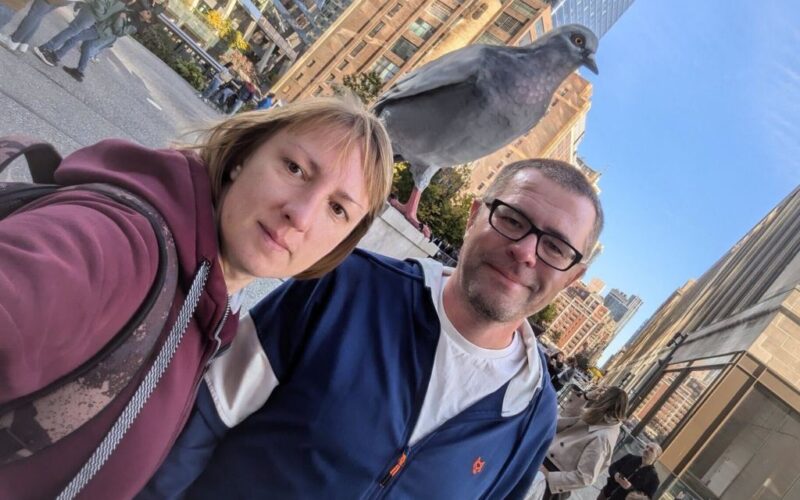The last time Ukrainian immigrant Kate Kirilenko saw her husband he was on a bench on the 10th floor of 26 Federal Plaza with chains around his waist, wrists and ankles.
That was June 27, three days after the couple went to the lower Manhattan immigration courthouse for what they expected would be a routine hearing for their joint asylum case. They’d fled Russia in 2023 fearing her husband’s anti-Putin politics and her Ukranian nationality would lead to persecution.
Inside the courtroom, an immigration judge denied a Department of Homeland Security lawyer’s motion to dismiss their case and told them to return to court in March 2026 for another hearing.
They thought they were safe from the Trumps administrations’s aggressive crackdown on immigration. But federal agents lurking outside the 12th floor courtroom arrested her and her husband, Alex Uzkii, anyway.
“As soon as we exited the courtroom we were grabbed,” Kirilenko, 39, said in Russian, through a translator. “They directed us into the elevator and pushed us up against the wall. My husband had our documents in his hand and they tried to take them away forcefully. He sort of tried to not let them. So they pushed him into the wall, hit him in the back and handcuffed him right there.”
Kirilenko said she was cuffed as they stepped out of the elevator onto what she believes was the 10th floor. The pair repeatedly asked why they were being detained. The agents, several covering their faces with masks, gave no answer.
“Horror. No thoughts. It was just fear,” she recalled.
Now, the life Kirlenko and her husband began building in New York is in pieces. She doesn’t know when or if he will come home. And though she was released from detention for medical reasons, she fears what will happen when she returns to the courthouse next month.
“I don’t know what they’ll do tomorrow. I don’t know what’s gonna happen with me. In September I can be detained. I don’t know what will happen with my husband,” she said. “I’m not sleeping almost at all. I wake up every hour. I have a lot of dreams, a lot of thoughts in my head.”
Michael Musa-Obregon, an attorney on the team representing the couple said they are working to free Uzkii, so he can return to New York and fight his case from outside a prison. There is also a possibility Kirilenko could be detained the next time she returns to court, he said.
“People are coming in to duly make their appointments, as is their responsibility and obligation,” Musa-Obregon said. “The idea of fighting meritorious cases such as [Kirilenko’s] and they are now being arrested in that process, you know, there’s something wrong with that. You can’t be punished for going to your court date. And that’s essentially what’s happening.”
The Department of Homeland Security did not respond to questions about the case.
Surprise arrest
Despite reading about ICE detaining immigrants at city courthouses, Kirilenko said they didn’t expect to be arrested since they had followed the rules. They crossed the southern border using the Biden administration’s CBP One app and filing for asylum within the one year deadline after arriving.
“We just didn’t think that this would affect us because we were never late, we never missed anything, everything was proper and legal in our case,” she said. “We just did not realize that people were being detained for nothing.”
Kirilenko spent nearly six days in detention before ICE released her for a major abdominal surgery she had already had scheduled. Uzkii, 46, remains in detention, far from home in Livingston, TX.
“It’s not fair that we were detained. We didn’t do anything wrong. We came here to look for protection from our country,” she said. “We did not do anything wrong. I want my husband to get out. He does not deserve to be arrested, to be kept in detention. We are not criminals.”
Kirilenko described her holding cell inside 26 Federal Plaza as a cold, cement room where women slept on benches or the floor, with just reflective blankets to keep them warm. The bathroom was attached to the room, with just a waist high wall blocking others’ view of the toilet, she said.

ICE fed the roughly 16 women being held in her room three times the first day, but other days only twice, she said. The menu included three or four varieties of hot soup, bagels with cheese, protein bars and cookies.
“There were instances where we would have to ask for water multiple times. I’m not sure why you had to ask multiple times,” she said.
Kirilenko said agents refused to let her take medication she’d had was prescribed to keep the cyst she would later have surgically removed from her ovaries from growing larger.
Meanwhile, Uzkii was inexplicably transported from 26 Federal Plaza to an upstate New York facility and back two times. Kirilenko watched through a glass panel in the door as agents shackled him in a reception area each time for the transport.
“I only saw him through the window. We tried to communicate with our fingers or read lips. It didn’t really work,” she said.
“[Alex] tried to encourage me. I cried and he looked very upset. We tried to speak but it was difficult because it’s very noisy inside the room, and he couldn’t hear me,” Kirilenko said of the last time they saw each other on June 27.
He was later flown across the country to a Louisiana detention facility before being moved to the IAH Polk Adult Detention Center in Texas.
On June 29, ICE officials made Kirilenko download a tracking app to her cellphone and they released her ahead of her major surgery the next day.

Kirilenko’s surgery went well and she was recovering at a friend’s place in Queens. But her rest was almost immediately disrupted when she was woken up from sleep at 7:22 a.m. the next morning by a message from ICE, asking her to report to court in person by 10 a.m. the same day.
Kirilenko had five incisions in her abdomen and was hardly able to get up from bed. After submitting a note from her surgeon saying recovery would take four to six weeks, ICE told her she could check in by submitting a photo of herself to the tracking app every week until further notice.
Being tracked has left Kirilenko wary of leaving her friend’s place, and she won’t even walk around the block for fresh air, her friend said.
Every morning Kirilenko looks forward to her ten-minute phone call with Uzkii.
“He mostly tries to cheer me up. He doesn’t complain much. He just tries to keep up my spirits,” she said. “He says that nothing much goes on where he is. He said even people who signed the paperwork to self-deport, they’re at this facility waiting for two months to be deported.”
A lonely July 4
Still thousands of miles apart from one another, Independence Day came and went, and Kirilenko thought of last year, when they went to the Macy’s 4th of July fireworks show on the Hudson River.
“It was a huge crowd. It was cool. In my city the fireworks are not so long and so varied. Different shapes. [Alex] also liked it,” she said. “We were thinking to go this year too.”
Uzkii, who was born in Russia, opposed the war against Ukraine and supported Russian opposition leader Alexei Navalny. Kirilenko, who was born in Ukraine and moved to Ryazan, Russia in 2010 to be with Uzkii, feared the worst living on the enemy’s turf.
“The situation became more difficult. The laws became stricter. People were persecuted for supporting Navalny and obviously if they knew you were Ukrainian,” she said. “It was becoming clear that things were about to get worse and worse. At that point it was literally a threat to our lives to continue to stay there. So we had to leave.”
Though it was never their dream to move to New York, Kirilenko said her husband was instantly charmed by the city.
“When we first arrived in New York my husband said, ‘Can you imagine we are in New York?’ We saw the Empire State Building, not just in pictures. In real life. He was very excited about it,” she said.
Kirilenko said they had “no life in Russia” anymore, and had began building a new life in the city, living in Midwood, Brooklyn, learning English and exploring the city.
“I’m not here just to make money, like some people. I want to live here, to integrate and be a part of it,” she said, adding that she is considering going to college to become a pharmacist or an accountant.
Uzkii, who holds a degree in radio technology, told Kirilenko his experience being detained has left him hoping to volunteer for an organization that helps other immigrants and to possibly become a lawyer in the future.
“We were interested in doing a drive through the country to see it. It’s so big. See the desert, go somewhere where there’s ocean and it’s warmer. See the mountains, the animals, the plants. Everything is different. Half of it doesn’t exist back in Russia,” she said. “We were very excited to do that, and now we sort of feel like there’s no hope.”
For now, they live every day in uncertainty, with no clarity on where their asylum case stands.
Kirilenko shared a message from Uzkii in Texas:
“It’s not fair that they grab people like that, yank them out of their lives, leaving a bunch of obligations on the outside. I want to be released, go back to New York, where I am a resident, and use my right to defend a case in immigration court without extra pressure.”








